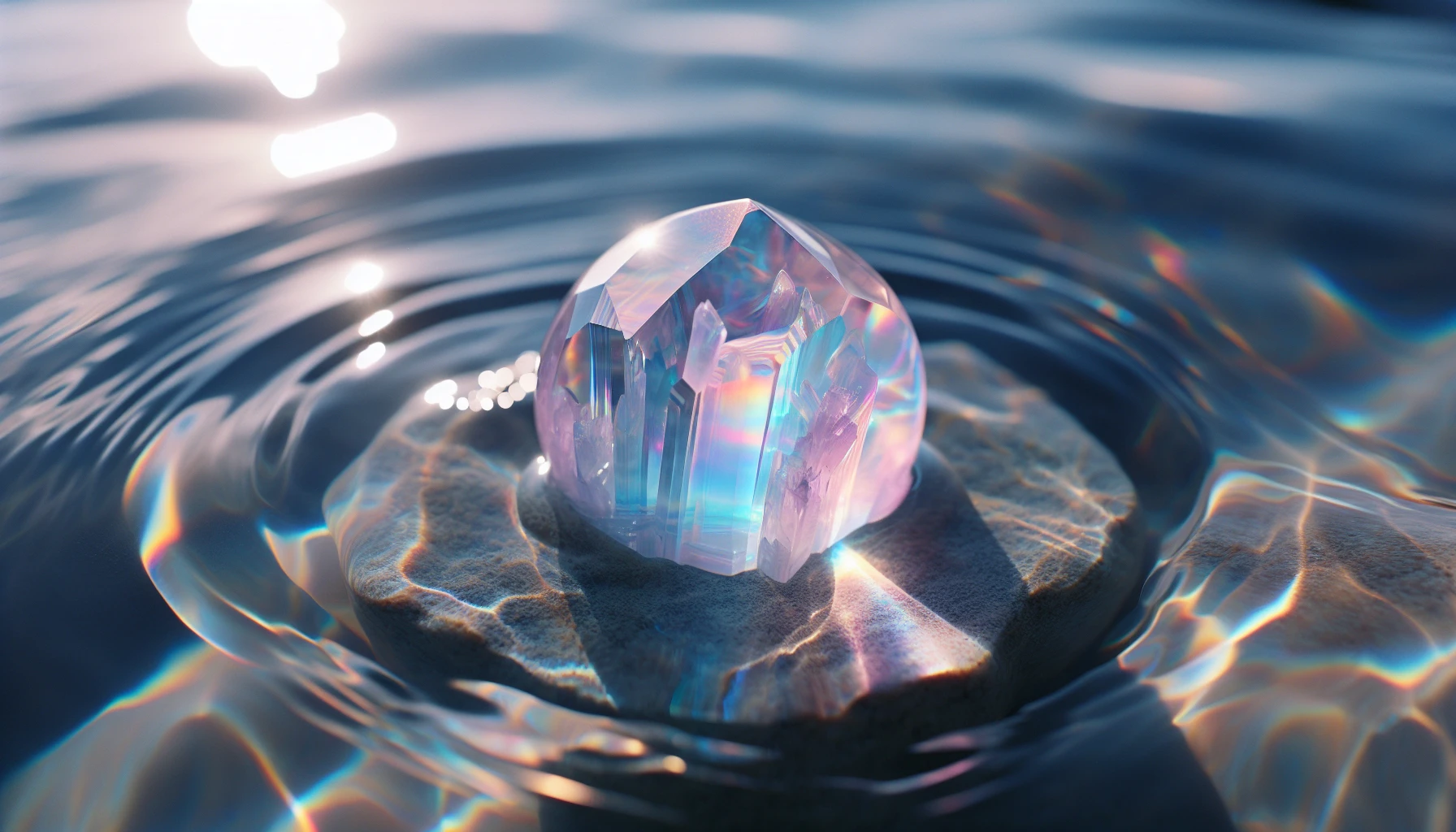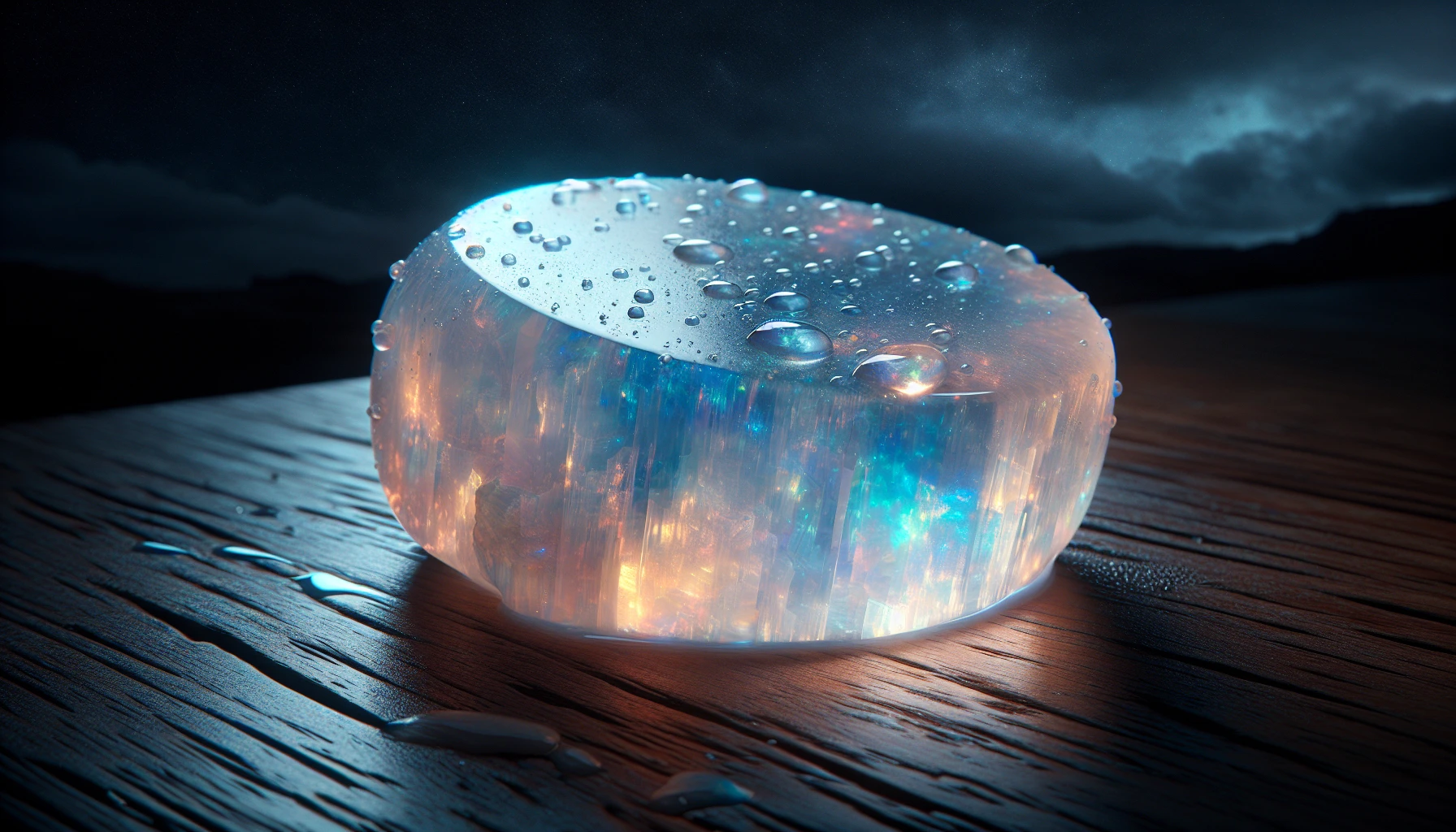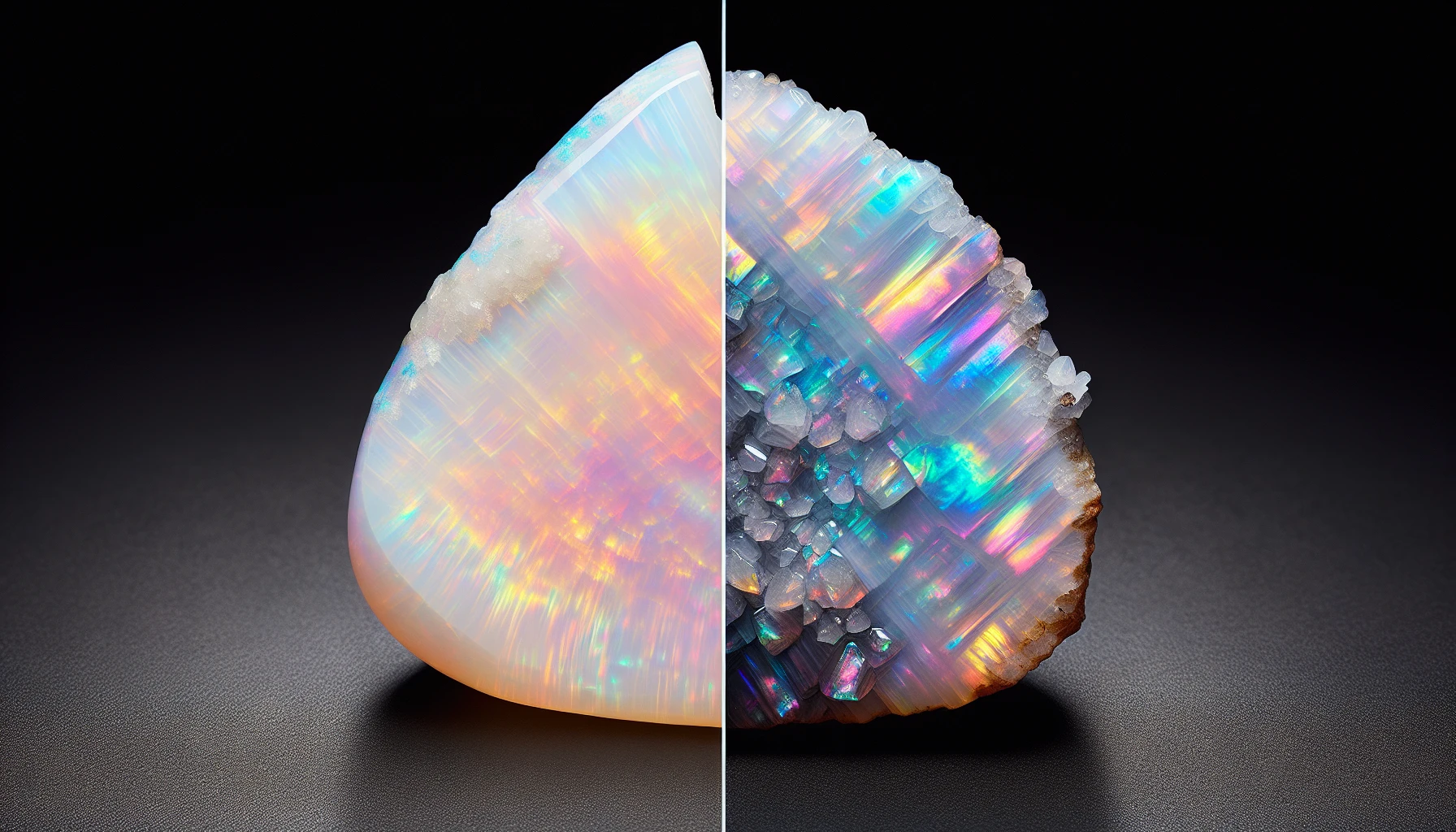Yes, Opalite can be exposed to water briefly, but prolonged or frequent water exposure, especially to saltwater or hot water, should be avoided to prevent damage.
Opalite, a captivating and iridescent crystal, is renowned for its stunning appearance and spiritual properties. As with any precious stone, proper care and maintenance are essential to preserve its beauty and energy. In this comprehensive guide, we’ll explore the question, “can opalite go in water?”, the effects of water exposure, and the best practices for cleansing and storing this enchanting gemstone.
Key Takeaways
- Opalite should be handled with care and not exposed to water for extended periods of time.
- Alternative methods such as moonlight charging or dry salt bed cleansing can be employed in lieu of water to cleanse the stone safely.
- Opalite should not be worn in pools or hot tubs due to potential harm caused by chlorine, bromine, and heat. Store opalite properly when not being used.
Is Opalite Water Safe?

Yes, Opalite is water safe, but it should not be exposed to water for prolonged periods, especially not to salt water or hot water, to avoid damage.
Despite Opalite not being a natural stone, handling opalite stones, as well as other stones, with care is required to preserve their distinct beauty and energy. While they can withstand occasional water exposure, continuous and extended contact may result in damage.
Maintaining the enchanting glow of opalite and its positive energy requires avoiding specific water types and conditions that may introduce negative energy.
Can Opalite Go In Salt Water?
No, it is not advisable to place opalite in saltwater as it can alter the stone’s look and chemical makeup, which can interfere with its healing properties.
Instead, opt for freshwater when cleansing opalite to ensure its preservation and continued radiance.
Can Opalite Go In Tap Water?
Yes, Opalite can be safely cleansed in tap water for crystal healing purposes, but extended exposure should be avoided and using normal or lukewarm water is recommended. This will help maintain the stone’s healing energies and prevent any potential damage.
Can Opalite Go In the Sun?
Yes, Opalite can go in the sun. Sunlight can charge Opalite, but overexposure should be avoided as it can cause the stone’s color to fade and become brittle. To charge opalite with sunlight, simply place it under the sun and allow it to absorb the energy for a short period of time.
Can Opalite Go In Salt?
Yes, Opalite can go in salt. For cleansing purposes, Opalite can be safely immersed in dry Himalayan salt, but contact with regular salt or saltwater should be avoided. This will help protect the stone from potential damage and maintain its unique properties.
Understanding Opalite’s Composition and Water Interaction

Opalite, also known as sea opal, is a man-made glass that replicates the appearance of natural opal and moonstone, making it a well-liked substitute for those seeking a more cost-effective alternative to these natural stones. Its vulnerability to water depends on its composition, which is primarily glass and other components that produce its opalescent appearance.
The Synthetic Creation of Opalite
Opalite, also known as opalite crystal, is synthesized from glass to simulate the appearance of natural opal and moonstone. The process, known as ‘hydrothermal synthesis,’ involves opalite crystals being created through:
- Dissolving silica in a heated solution
- Cooling and solidification to mimic the natural formation of opal
- Cutting, polishing, and shaping the synthetic opal into various forms.
Opalite’s Vulnerability to Water
The susceptibility of opalite to water varies depending on its composition, with natural opalite being more vulnerable to damage. Man-made opalite has some resilience when it comes to being submerged in water. It can be kept underwater for a period of two hours with minimal risks. However, there is no complete assurance that lasting damage may not occur..
Precautions should be taken when rinsing or bathing opalite in water to avoid potential harm.
What Are Immediate Effects of Water on Opalite?
Opalite, being a soluble stone, disintegrates when it comes in contact with water, leading to fractures that may not be visible initially but will become noticeable upon detailed inspection. To prevent damage to opalite’s appearance, it is essential to avoid letting opalite go in water for extended periods and use water sparingly.
What Are Long-Term Risks of Water Exposure for Opalite?

Continuous water exposure can cause structural damage, brittleness, and discoloration to opalite. To preserve the stone’s beauty and energy, it is crucial to avoid prolonged immersion in water and to store it in a cool, dry place when not in use.
What Are Best Practices to Safely Cleanse Opalite?
To safely cleanse of opalite, follow these steps:
- Use water judiciously and refrain from soaking the stone for long durations.
- After cleaning, be sure to thoroughly dry opalite to prevent any potential damage.
- If you prefer to use tap water, be sure to use normal or lukewarm water and avoid prolonged exposure.
How to Cleanse Opalite Without Water?
To cleanse Opalite without water, use moonlight charging and dry salt bed cleansing. These methods provide a gentle and effective way to cleanse and recharge the stone while avoiding potential damage from water exposure.
Moonlight Charging: A Gentle Alternative
Moonlight charging is a gentle and efficient method for cleansing opalite. To charge opalite with moonlight, simply follow these steps:
- Place the stone under the moonlight.
- Leave it there until either midnight or dawn.
- Allow the stone to absorb the moon’s energy and release any negative energies it may have accumulated.
This method taps into the moon’s energy and recharges the opalite, leaving it cleansed and ready to use.
Dry Salt Bed Cleansing
Dry salt bed cleansing requires:
- Placing opalite on a bed of dry salt, like sea salt or Himalayan salt
- The salt absorbs negative energies and purifies the stone
- This method is effective and safe, as it avoids potential damage from water exposure.
To cleanse opalite with this method, simply place the stone on a bed of salt and leave it there for several hours or overnight.
The Spiritual Connection: Opalite Elixirs and Infused Waters
Correctly prepared and consumed opalite elixirs and infused waters offer a range of spiritual benefits. These benefits include emotional equilibrium, spiritual development, and access to intuitive abilities. However, it is essential to properly prepare opalite elixirs and infused waters to ensure their safety and effectiveness.
Preparing Your Opalite Elixir Safely
To prepare a safe opalite elixir, follow these steps:
- Place the opalite stone in a vessel filled with fresh water.
- Keep the vessel outside under moonlight or sunlight to steep with healing energy.
- Be sure to use the elixir sparingly due to opalite’s high vibrational properties, as overindulgence may be overwhelming.
Drinking Opalite Infused Water: Benefits and Cautions
Drink opalite infused water to experience a range of healing benefits, including emotional balance, spiritual growth, and inner strength. However, it is crucial to ensure the opalite is clean and the water is strained before consumption to prevent any potential harm.
Always exercise caution and follow proper preparation guidelines when consuming opalite-infused water.
Opalite Jewelry and Water Contact
To shield your opalite jewelry from water damage, consider removing it before showering or swimming. Exposure to water can cause glue and layers to separate, resulting in a foggy or cloudy appearance. Additionally, chemicals in pool and hot tub water can cause corrosion and tarnishing of the metals in the jewelry, diminishing its quality and appearance.
Can Opalite Go in Pools or Hot Tubs?
Avoid placing Opalite in pools or hot tubs, as the chemicals and heat can harm the stone. Chlorine and bromine can be particularly harmful to opalite, and exposure to heated water can lead to cracking or breaking of the stone.
To prevent damage, always remove opalite jewelry before entering pools or hot tubs.
Preserving the Beauty of Opalite: Storage Tips
Proper storage is necessary to maintain the beauty and energy of opalite. Here are some tips for storing opalite:
- Keep opalite away from direct sunlight and harsh chemicals.
- Store it in a cool, dry place.
- To protect the stone from scratches and damage during storage, store it in a soft, padded jewelry box or a cloth bag.
For extended storage durations, wrap opalite in a cotton or wool cloth with a few drops of water, and then seal it in a plastic bag. This helps retain its moisture and offers extra protection.
Summary
In conclusion, opalite is a stunning and spiritually powerful stone that requires proper care and maintenance to preserve its beauty and energy. By following the guidelines provided in this comprehensive guide, you can ensure the longevity and vibrancy of your opalite, whether it’s in the form of jewelry, elixirs, or decorative pieces.
Frequently Asked Questions About Opalite In Water
How durable is Opalite?
Opalite has a hardness rating of 5/10 on the Mohs scale, making it quite delicate in comparison to Opal which has a 5.5 – 6.5 rating. As such, its durability is relatively low.
Is Opalite a glass or stone?
Opalite is a man-made glass composed primarily of silica and other minerals, which gives it the unique optical properties to emulate opals and moonstones. It is also used to promote impure varieties of variously colored common opal. Therefore, it can be concluded that Opalite is a glass.
How do you cleanse Opalite?
For optimal energy, regularly clear your Opalite with a variety of methods, such as moonlight, a circle of salt, or soundwaves.
Can Opalite be safely placed in water?
Opalite can be exposed to water, but it should be avoided in saltwater or hot water to prevent damage.
What are the spiritual benefits of Opalite-infused water and elixirs?
Opalite-infused water and elixirs can offer emotional balance, spiritual growth, and a connection to intuition, providing valuable spiritual benefits.